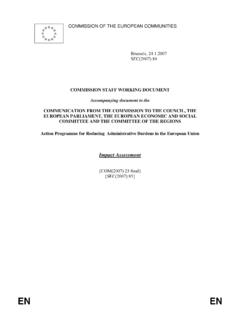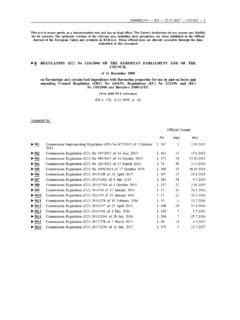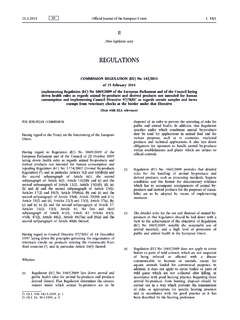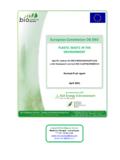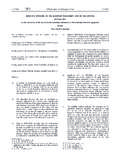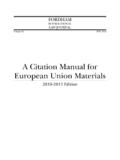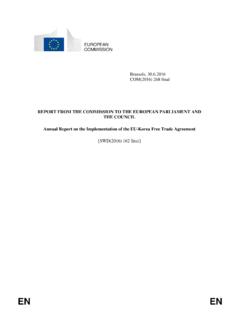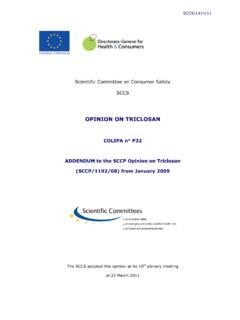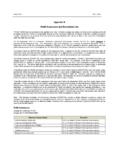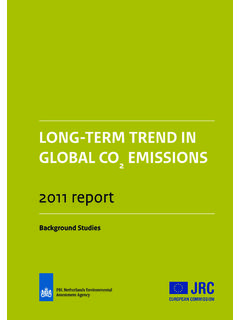Transcription of Regulation (EU) No 1169/2011 of the European Parliament ...
1 Regulation (EU) No 1169/2011 OF THE European Parliament AND OF THE COUNCIL of 25 October 2011 on the provision of food information to consumers, amending regulations (EC) No 1924/2006 and (EC) No 1925/2006 of the European Parliament and of the Council, and repealing Commission Directive 87/250/EEC, Council Directive 90/496/EEC, Commission Directive 1999/10/EC, Directive 2000/13/EC of the European Parliament and of the Council, Commission Directives 2002/67/EC and 2008/5/EC and Commission Regulation (EC) No 608/2004 (Text with EEA relevance)
2 THE European Parliament AND THE COUNCIL OF THE European UNION, Having regard to the Treaty on the Functioning of the European Union, and in particular Article 114 thereof, Having regard to the proposal from the European Commission, Having regard to the opinion of the European Economic and Social Committee ( 1 ), Acting in accordance with the ordinary legislative procedure ( 2 ), Whereas: (1) Article 169 of the Treaty on the Functioning of the European Union (TFEU) provides that the Union is to contribute to the attainment of a high level of consumer protection by the measures it adopts pursuant to Article 114 thereof.
3 (2) The free movement of safe and wholesome food is an essential aspect of the internal market and contributes significantly to the health and well-being of citizens, and to their social and economic interests. (3) In order to achieve a high level of health protection for consumers and to guarantee their right to information, it should be ensured that consumers are appropriately informed as regards the food they consume.
4 Consumers choices can be influenced by, inter alia, health, economic, environmental, social and ethical considerations. (4) According to Regulation (EC) No 178/2002 of the European Parliament and of the Council of 28 January 2002 laying down the general principles and requirements of food law, establishing the European Food Safety Authority and laying down procedures in matters of food safety ( 3 ) it is a general principle of food law to provide a basis for consumers to make informed choices in relation to food they consume and to prevent any practices that may mislead the consumer.
5 (5) Directive 2005/29/EC of the European Parliament and of the Council of 11 May 2005 concerning unfair business- to-consumer commercial practices in the internal market ( 4 ) covers certain aspects of the provision of information to consumers specifically to prevent misleading actions and omissions of information. The general principles on unfair commercial practices should be complemented by specific rules concerning the provision of food information to consumers.
6 (6) Union rules on food labelling applicable to all foods are laid down in Directive 2000/13/EC of the European Parliament and of the Council of 20 March 2000 on the approximation of the laws of the Member States relating to the labelling, presentation and advertising of foodstuffs ( 5 ). The majority of the provisions laid down in that Directive date back to 1978 and should therefore be updated. (7) Council Directive 90/496/EEC of 24 September 1990 on nutrition labelling for foodstuffs ( 6 ) lays down rules on the content and presentation of nutrition information on prepacked foods.
7 According to those rules, the inclusion of nutrition information is voluntary unless a nutrition- related claim is made concerning the food. The majority of the provisions laid down in that Directive date back to 1990 and should therefore be updated. (8) The general labelling requirements are complemented by a number of provisions applicable to all foods in particular circumstances or to certain categories of foods. In addition, there are a number of specific rules which are applicable to specific L 304/18 Official Journal of the European Union ( 1 ) OJ C 77, , p.
8 81. ( 2 ) Position of the European Parliament of 16 June 2010 (OJ C 236 E, , p. 187) and position of the Council at first reading of 21 February 2011 (OJ C 102 E, , p. 1). Position of the European Parliament of 6 July 2011 (not yet published in the Official Journal) and decision of the Council of 29 September 2011 . ( 3 ) OJ L 31, , p. 1. ( 4 ) OJ L 149, , p. 22. ( 5 ) OJ L 109, , p. 29. ( 6 ) OJ L 276, , p. 40.(9) While the original objectives and the core components of the current labelling legislation are still valid, it is necessary to streamline it in order to ensure easier compliance and greater clarity for stakeholders and to modernise it in order to take account of new devel opments in the field of food information.
9 This Regulation will both serve the interests of the internal market by simplifying the law, ensuring legal certainty and reducing administrative burden, and benefit citizens by requiring clear, comprehensible and legible labelling of foods. (10) The general public has an interest in the relationship between diet and health and in the choice of an appro priate diet to suit individual needs. The Commission White Paper of 30 May 2007 on a Strategy for Europe on Nutrition, Overweight and Obesity related health issues (the Commission White Paper ) noted that nutrition labelling is one important method of informing consumers about the composition of foods and of helping them to make an informed choice.
10 The Commission Communication of 13 March 2007 entitled EU Consumer Policy strategy 2007-2013 Empowering consumers, enhancing their welfare, effectively protecting them underlined that allowing consumers to make an informed choice is essential both to effective competition and consumer welfare. Knowledge of the basic principles of nutrition and appro priate nutrition information on foods would contribute significantly towards enabling the consumer to make such an informed choice.


